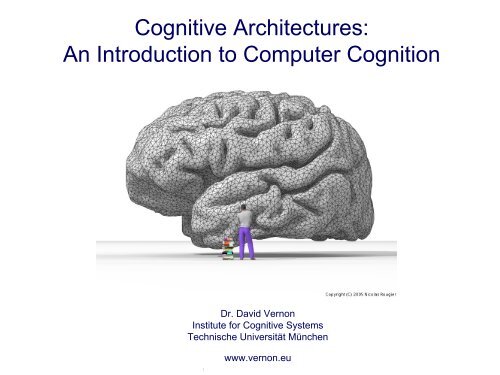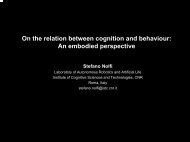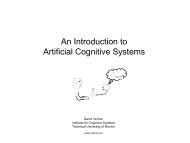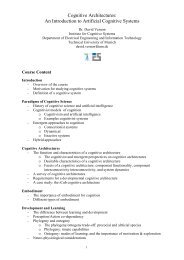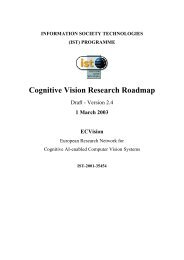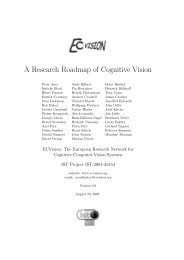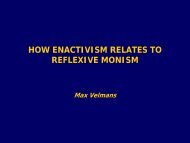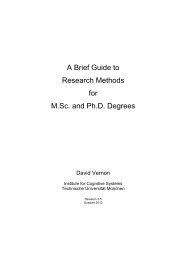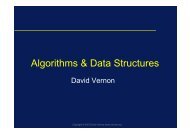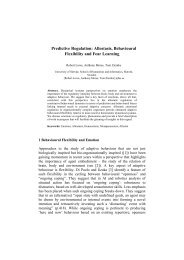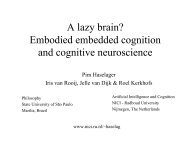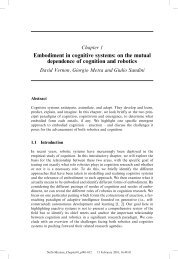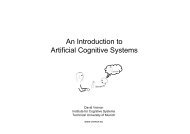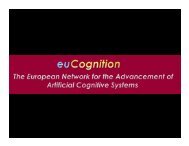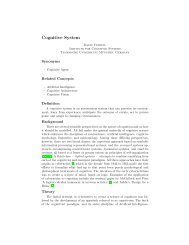Artificial Cognitive Systems: An Introducation - David Vernon
Artificial Cognitive Systems: An Introducation - David Vernon
Artificial Cognitive Systems: An Introducation - David Vernon
Create successful ePaper yourself
Turn your PDF publications into a flip-book with our unique Google optimized e-Paper software.
<strong>Cognitive</strong> Architectures:<br />
<strong>An</strong> Introduction to Computer Cognition<br />
Dr. <strong>David</strong> <strong>Vernon</strong><br />
Institute for <strong>Cognitive</strong> <strong>Systems</strong><br />
Technische Universität München<br />
www.vernon.eu<br />
Copyright © 2012 <strong>David</strong> <strong>Vernon</strong>
Lecture 10<br />
Knowledge<br />
Copyright © 2012 <strong>David</strong> <strong>Vernon</strong>
Representation and Symbols<br />
• What is being represented by a representation<br />
– Depends on the paradigm: cognitivist systems or emergent<br />
systems<br />
• Cognitivist<br />
– One-to-one mapping between some internal state (represented<br />
symbolically) and some absolute counterpart in the world.<br />
– The representation is a model of the real world<br />
– Since the world is absolute and unique (and not contingent on<br />
the observer), the models in all cognitive agents are consistent<br />
and compatible<br />
– Consequence: the designer of a cognitive system can implant<br />
representations in the agent<br />
– Knowledge can be shared directly<br />
Copyright © 2012 <strong>David</strong> <strong>Vernon</strong>
Representation and Symbols<br />
• What is being represented by a representation<br />
– Depends on the paradigm: cognitivist systems or emergent<br />
systems<br />
• Emergent<br />
– No right to assert that your perceptions are identical with other<br />
agents<br />
– Perceptions are shaped by action and the possibility of action<br />
– Representation is agent-specific<br />
– Can’t implant representations directly into the agent<br />
– Knowledge must be agreed (and meaning negotiated)<br />
Copyright © 2012 <strong>David</strong> <strong>Vernon</strong>
Copyright © 2012 <strong>David</strong> <strong>Vernon</strong>
Copyright © 2012 <strong>David</strong> <strong>Vernon</strong>
Knowledge<br />
• Two Key Questions:<br />
– Where does knowledge come from<br />
– What relationship does it imply between cognitive agent and the<br />
world<br />
• Cognitivist <strong>An</strong>swer<br />
– Provided in symbolic form by humans<br />
– Refined by learning<br />
– Brittle representations (designer assumptions)<br />
Copyright © 2012 <strong>David</strong> <strong>Vernon</strong>
Knowledge<br />
• Two Key Questions:<br />
– Where does knowledge come from<br />
– What relationship does it imply between cognitive agent and the<br />
world<br />
• Hybrid <strong>An</strong>swer<br />
– Generic representational schemes (e.g. ISA, ICA, PCA)<br />
– Populated by incremental unsupervised learning<br />
– But behaviour is designed in (links between actions and<br />
perceptions)<br />
– Combination of agent-specific and agent-acquired knowledge<br />
and pre-programmed perception-reasoning-action strategies<br />
Copyright © 2012 <strong>David</strong> <strong>Vernon</strong>
Knowledge<br />
• Two Key Questions:<br />
– Where does knowledge come from<br />
– What relationship does it imply between cognitive agent and the<br />
world<br />
• Emergent <strong>An</strong>swer<br />
– Connectionist / dynamical approaches<br />
– No symbolic representations<br />
– Knowledge is encapsulated by system states<br />
– Acquired by exploration and social interaction<br />
Copyright © 2012 <strong>David</strong> <strong>Vernon</strong>
Memory<br />
• Knowledge is (relatively) persistent<br />
• Types of memory<br />
– Procedural memory / implicit memory<br />
– Declarative / working memory / explicit memory<br />
• Episodic memory<br />
• Semantic memory<br />
– Modal memory (visual/acoustic)<br />
– Short-term memory<br />
– Long-term memory<br />
Copyright © 2012 <strong>David</strong> <strong>Vernon</strong>
Memory<br />
• Memory recall<br />
– Associative<br />
• Auto-associative<br />
• Hetero-associative<br />
– Symbolic index<br />
• Memory degradation<br />
– Graceful degradation<br />
– Avoid catastrophic forgetting<br />
– Loss of important memories when something new is learned<br />
Copyright © 2012 <strong>David</strong> <strong>Vernon</strong>
Symbol Grounding<br />
• How do representations acquire meaning<br />
• How do symbolic representations acquire semantics<br />
– Symbol grounding problem<br />
• Steven Harnad:<br />
– Symbolic representations grounded bottom-up in non-symbolic<br />
representations<br />
• Iconic representations (derived directly from sensory data)<br />
• Categorical representations (based on the output of learned and<br />
innate processes for detecting invariances / invariant features in<br />
the sensed data)<br />
Copyright © 2012 <strong>David</strong> <strong>Vernon</strong>
The Frame Problem<br />
• “How can we build a program capable of inferring the<br />
effects of an action without reasoning explicitly about all<br />
its obvious non-effects”[Shanahan Baars 2005]<br />
• “How.does the machine’s program determine which<br />
beliefs the robot ought to re-evaluate given that it has<br />
embarked upon some or other course of action” [Fodor<br />
1983]<br />
• The issue is how to ignore non-effects of actions on the<br />
agent’s knowledge<br />
Copyright © 2012 <strong>David</strong> <strong>Vernon</strong>
Recommended Reading<br />
…<br />
Copyright © 2012 <strong>David</strong> <strong>Vernon</strong>


